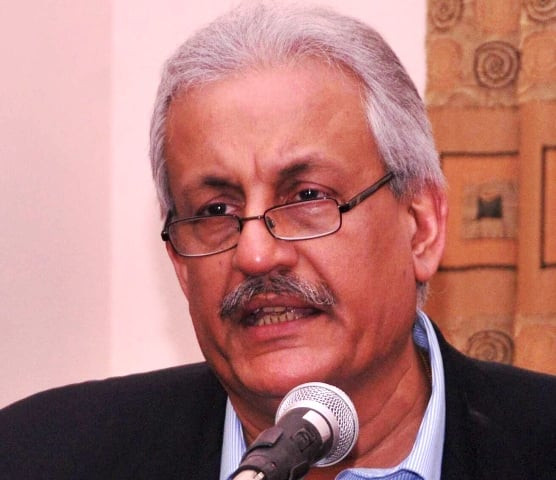Judicial and political restraint should be exercised: Senator Raza Rabbani
Ishaq Dar says the law ties the hands of the judiciary. Rabbani says new power centres are emerging.

This was expressed by Senator Raza Rabbani of Pakistan Peoples Party (PPP) while speaking at a dialogue ‘Conflict of Institutions and Sustainability of Democracy’ organised by South Asian Free Media Association (SAFMA) here on Saturday.
“Political parties have to remain steadfast through the transition period and the long process of development of institutions in this country. They are not formed and developed over night,” said Rabbani.
Explaining transition period, the PPP senator who recently recorded his personal reservations in the upper house of the parliament on Dual Nationality Bill moved by his party, said that despite its mistakes, the current parliament has shown enough maturity and a degree of political restraint that has kept the non-democratic forces at bay.
Referring to the debate on institutions over-stepping their authority and limits, Rabbani said the civil-military bureaucracy, for the first time, was losing grip in the transition period where new power centers were emerging.
“When new power centers emerge there is bound to be a turf war and every institution tries to expand on its limits,” said Rabbani, adding that political constraint excercised at this point in time would stop the civil-military bureaucracy that was still pulling strings from dislogding the process of politicial development in the country.
Senator Rabbani spoke after other parliamentarian including Haider Abbasi Rizvi of Mutahida Qaumi Movement (MQM), Bushra Gohar of Awami National Party (ANP) and Senator Ishaq Dar from Pakistan Muslim League (Nawaz), all of whom generally supported the idea of institution not over-stepping authority.
However, most parliamentarians reperesented their respective party line on current national issues including the recent legislation on contempt of court while they urged all political parties, at the same time, to rise above party interests in the greater national interest.
Senator Ishaq Dar, after criticisizing the ruling coalition on its failure to control inflation, unemployment, public debt and its policy of confrontation with judiciary, said they were enough reasons for it to quit.
On the contempt law, he said he was glad that the legislation could not sustain. “Through this legislation, you are tying judiciary’s hands,” said Senator Dar. He said his party had no personal relation with judiciary, ‘we only want rule of law and every institution to work within its boundaries defined in the constitution,” said the PML-N senator. However, he said he supports the idea of a new social contract for the country.
Bushra Gohar MNA (ANP) praised the role of political parties, particularly opposition, for keep the non-democratic forces away. “There are always certain non-democratic forces waiting for opportunity. I am glad that we have denied them one so far,” said Gohar.
Criticising Diffa-e-Pakistan Council (DPC), she said "what was army doing if we need a council to protect the country." The ANP leader said people should forget democracy if they wanted to make Pakistan a security state.
Earlier speaking on conflict of institutions part of the dialogue, member National Assembly from MQM Haider Abbas Rizvi said people of the country wanted Adal from courts not Insaaf which would mean making a murderer to pay dayat (compensation) instead of eye for eye.
Summing up the discussion, Imtiaz Alam from SAFMA said that elections should be held at the right time with the consensus of political parities like the one shown in the case of appointment of Chief Election Commissioner recently.



















COMMENTS
Comments are moderated and generally will be posted if they are on-topic and not abusive.
For more information, please see our Comments FAQ